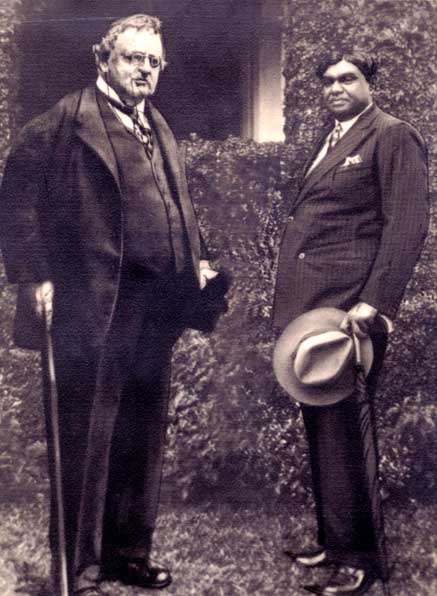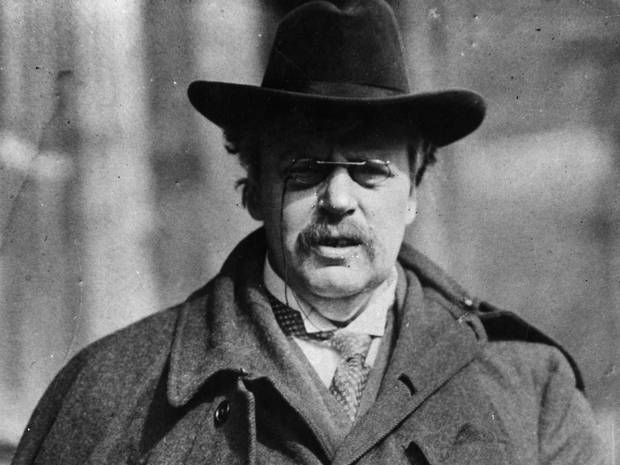 J. P. De Fonseka was one of the greatest English writers Ceylon ever produced. He has been compared with the the best of English essayists like Charles Lamb, E. V. Lucas, G. K. Chesterton and Hilaire Belloc and was a friend and great admirer of Gilbrt Keith Chesterton. In fact he was natured in the Chester-Belloc school of writing and G. K. was to have a great influence on his writings. This close association brought them together many times. J. P. closely associated Chesterton while he was in England during the period 1926 to 1930. This rare picture of that association shows G. K. Chesterton with J. P. de Fonseka, possibly taken around 1929 while J. P. was in England.
J. P. De Fonseka was one of the greatest English writers Ceylon ever produced. He has been compared with the the best of English essayists like Charles Lamb, E. V. Lucas, G. K. Chesterton and Hilaire Belloc and was a friend and great admirer of Gilbrt Keith Chesterton. In fact he was natured in the Chester-Belloc school of writing and G. K. was to have a great influence on his writings. This close association brought them together many times. J. P. closely associated Chesterton while he was in England during the period 1926 to 1930. This rare picture of that association shows G. K. Chesterton with J. P. de Fonseka, possibly taken around 1929 while J. P. was in England.
J. P. also counted amongst his friends, some of the literary giants of the era. Names mentioned in the articles about him include Hilaire Belloc, E. V. Lucas, Bernard Shaw, Robert Lynd, Eric Gill, A. P. Herbert, Walter de la Mare, Sir John Squire, and Francis Thompson among others. J. P. also edited two of Chesterton’s Anthologies (collections of Essays) in 1929.
A comprehensive list of Chesterton publications, included in a website dedicated to him, lists two books which J. P. contributed as editor or compiler. An extract from this comprehensive list is reproduced below. A link to this website has been provided at the end of this page.
The writings of G. K. Chesterton:
G.K. Chesterton was one of the finest writers of the 20th century. He said something about everything and he said it better than anybody else. The reason he was one of the greatest writer of the 20th century was because he was also one of the greatest thinker of the 20th century.
This was the man who wrote a book called ‘The Everlasting Man’, which led a young atheist named C.S. Lewis to become a Christian. This was the man who wrote a novel called ‘The Napoleon of Notting Hill’, which inspired Michael Collins to lead a movement for Irish Independence. This was the man who wrote an essay in the Illustrated London News that inspired Mohandas Gandhi to lead a movement to end British colonial rule in India.
Chesterton had no difficulty standing up for what he believed. He was one of the few journalists to oppose the Boer War. His 1922 Eugenics and Other Evils attacked what was at that time the most progressive of all ideas, the idea that the human race could and should breed a superior version of itself. In the Nazi experience, history demonstrated the wisdom of his once “reactionary” views.
Chesterton debated many of the celebrated intellectuals of his time: George Bernard Shaw, H.G. Wells, Bertrand Russell, Clarence Darrow. According to contemporary accounts, Chesterton usually emerged as the winner of these contests. However, the world has immortalized his opponents and forgotten Chesterton. Ironically, all of his opponents regarded Chesterton with the greatest affection. And George Bernard Shaw said: “The world is not thankful enough for Chesterton.” T. S. Eliot once said that Chesterton “deserves a permanent claim on our loyalty.”
Brief bio sketch of G. K. Chesterton
 Gilbert Keith (“G.K.”) Chesterton was born on May 29th, 1874 on Campden Hill, in Kensington U. K. At some point (Sunday, July 30, 1922 if you’re curious) he converted from the Anglican Church to the Roman Catholic Church, which really ticked off his good friend, George Bernard Shaw. He died on June 14th of 1936, a Tuesday.
Gilbert Keith (“G.K.”) Chesterton was born on May 29th, 1874 on Campden Hill, in Kensington U. K. At some point (Sunday, July 30, 1922 if you’re curious) he converted from the Anglican Church to the Roman Catholic Church, which really ticked off his good friend, George Bernard Shaw. He died on June 14th of 1936, a Tuesday.
Chesterton was educated at St. Paul’s, but never went to college. He went to art school. In 1900, he was asked to contribute a few magazine articles on art criticism, and went on to become one of the most prolific writers of all time. He wrote a hundred books, contributions to 200 more, hundreds of poems, including the epic Ballad of the White Horse, five plays, five novels, and some two hundred short stories, including a popular series featuring the priest-detective, Father Brown.
Chesterton died on the 14th of June, 1936 in Beaconsfield, Buckinghamshire.
Some choice quotes from G. K. Chesterton.
- A good novel tells us the truth about it’s hero; but a bad novel tells us the truth about its author.
- Angels fly because they take themselves lightly.
- Democracy means government by the uneducated, while aristocracy means government by the badly educated.
- Do not free the camel of the burden of his hump; you may be freeing him from being a camel.
- I believe in getting into hot water. I think it keeps you clean.
- I’ve searched all the parks in all the cities and found no statues of committees.
- Journalism consists largely in saying ”Lord James is dead” to people who never knew Lord James was alive.
- Merely having an open mind is nothing; the object of opening the mind, as of opening the mouth, is to shut it again on something solid.
- Moderate strength is shown in violence, supreme strength is shown in levity.
- No man knows he is young while he is young.
- People generally quarrel because they cannot argue.
- The only way of catching a train I have ever discovered is to miss the train before.
- The reformer is always right about what is wrong. He is generally wrong about what is right.
- To be clever enough to get all the money, one must be stupid enough to want it.
- Truth is sacred; and if you tell the truth too often nobody will believe it.
ADDITIONAL RESOURCES:
- G. K. Chesterton – Works on the Web.
Includes a complete bibliography of material by and about G. K. Chesterton
(http://www.dur.ac.uk/martin.ward/gkc) - G. K. Chesterton – The “Colossal Genius”
(http://ic.nef/~erasmus/RAZ27.HTM) - The American Chesterton Society
(http://www.chesterton.org/)
Photograph of J. P. with Chesterton, kind courtesy of Peter Waas, UK. This photo was with Peter’s mother, a niece of J.P.
Bio Sketch and details of G. K. Chesterton from the above websites. Please visit these informative websites for more details.